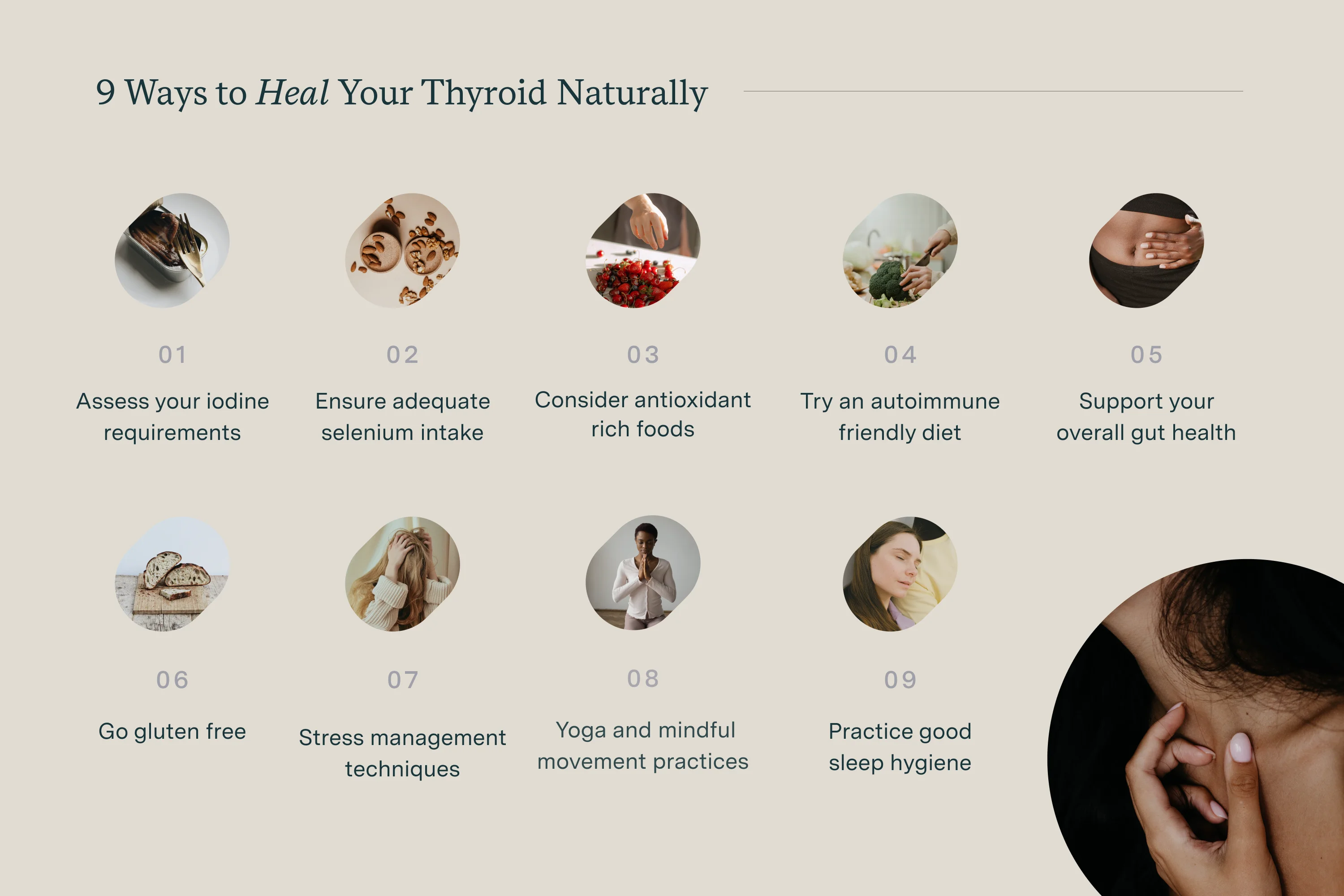Your thyroid, a butterfly-shaped gland found in the front of your neck, is part of a larger network of glands and organs that make up your endocrine system. This system, including your thyroid, uses hormones, which are chemical messengers, to influence your reproductive health, growth and development, metabolism, and energy levels. (Source)
If your thyroid produces too few hormones (known as underactive thyroid or hypothyroidism) or too many hormones (known as overactive thyroid or hyperthyroidism), it can cause a cascade of health problems, including those with an autoimmune connection. (Source)
In addition to genetic predisposition, medical history, and environmental triggers, diet and lifestyle can influence your overall thyroid health. In this article we’ll review thyroid function, supportive modifications designed to optimize your thyroid, and natural interventions to consider in tandem with treatment.

Your Thyroid Gland
Your thyroid produces three hormones: thyroxine (T4), triiodothyronine (T3), and calcitonin. While T4 and T3 affect metabolism and body temperature, calcitonin influences bone development by regulating blood calcium levels. (Source)
Your pituitary gland, which makes thyroid stimulating hormone (TSH), is also a member of your endocrine system. The amount of TSH produced by your pituitary gland directly influences how much T4, and subsequently T3, your thyroid gland synthesizes. (Source)
Thyroid Disorders
When your thyroid is functioning optimally, it creates, uses, and replenishes its hormones continuously. If your thyroid’s health is disrupted in any way, it may underproduce or overproduce its hormones. In time, this can result in a variety of disorders including hypothyroidism (categorized by insufficient thyroid hormone production) or hyperthyroidism (excessive thyroid hormone production). (Source)
Thyroid disorders are relatively common, but often go undiagnosed. According to the American Thyroid Association, it’s estimated that approximately 20 million Americans live with thyroid disorders, and as many as 60 percent are unaware of their condition. (Source)
Thyroid disorders can be influenced by a number of factors including:
- diet
- stress
- environmental influences
- heavy metal exposure
- radiation
- thyroid removal due to cancer treatment
- medication
- infection
- pregnancy
- family history
- autoimmune conditions
.webp)
Hypothyroidism and Autoimmunity
Hypothyroidism is diagnosed in part through laboratory tests, notably blood work measuring your hormone levels. Typically, if you have hypothyroidism your T4 level is lower than normal, and your TSH level is higher than normal. (Source)
Although hypothyroidism can develop during any point in your life, the likelihood of developing the disorder increases with age. Women are up to 8 times more likely to develop thyroid issues than men. (Source)
Hashimoto’s Thyroiditis
Hashimoto’s thyroiditis is the most common cause of hypothyroidism in the United States. This autoimmune thyroid disease occurs when your immune system produces antibodies that mistakenly attack your gland and damage your hormone producing cells. Your thyroid, now impaired and inflamed, can become underactive. (Source)
Symptoms of Hashimoto’s Thyroiditis
If your Hashimoto’s is not treated in a timely manner, you can develop goiter (an enlarged thyroid gland), cardiometabolic issues (relating to your cardiovascular system and metabolic health), mental health issues (such ad cognitive dysfunction or depression), or impaired reproductive function (such as an irregular menstrual cycle). (Source, )
Symptoms of Hashimoto’s may differ between individuals, depending on how much the disease has progressed. Other symptoms include but are not limited to:
- fatigue
- sluggishness
- dry skin
- cold hands and feet
- sensitivity to cold
- constipation
- hair loss
- joint and muscle pain or discomfort
- enlarged tongue
(Source)
Hyperthyroidism and Autoimmunity
Hyperthyroidism is typically diagnosed through laboratory tests, notably blood work measuring your hormone production. In the case of hyperthyroidism, your T4 level and T3 level are higher than normal and your TSH level is lower than normal. Although hyperthyroidism can occur at any life stage, women are 10 times more likely to develop hyperthyroidism than men, usually between the ages of 20 to 40 years old. (Source)
Grave’s Disease
Grave’s disease is the most common cause of hyperthyroidism in the United States, affecting 3 out of 4 people diagnosed with hyperthyroidism. Like Hashimoto’s thyroiditis, Grave’s disease occurs when your immune system mistakenly attacks your thyroid, damaging the gland to the extent that it overcorrects and increases hormone production. (Source)
Symptoms of Grave’s Disease
Symptoms of Grave’s disease vary based on the extent of disease progression. Some symptoms of Grave’s disease overlap with Hashimoto’s, including changes in mood, reproductive dysfunction, fatigue, or goiter development (enlarged thyroid gland). (Source)
Other symptoms specific to Grave’s disease include:
- irritability
- twitching
- increase in heart beat
- insomnia
- weight loss
- sensitivity to heat
- eye issues (notably bulging eyes or double vision)
(Source)
.webp)
Consult Your Care Provider to Determine Your Plan
If you suspect that you have thyroid dysfunction, it’s important to speak with your health care provider to determine your path forward. In addition to running diagnostic tests including blood work, your provider may recommend an ultrasound of your thyroid, a radioactive iodine uptake test, and a physical exam. They will likely inquire about your family history and other health conditions. Depending on your results, they may prescribe you medication to correct your hormone levels. (Source, Source)
In addition to conventional medical treatment plans, supportive dietary and lifestyle changes can have a positive effect on your overall thyroid health. Natural interventions may vary depending on your official diagnosis, from personalized nutrition practices and stress management, to other complementary lifestyle interventions. Many of these can be used in tandem with the treatment provided by your care team.

.svg)
.png)





.webp)
.webp)
.webp)
.webp)







.webp)



.png)

 (1).webp)









 (1).jpeg)

.webp)
.webp)

.webp)

 (2).webp)

%201 (1).webp)

 2 (1).webp)




.svg)
.svg)